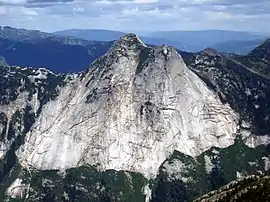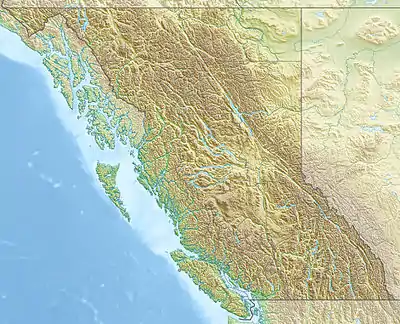Yak Peak
Yak Peak is a granite summit located adjacent the Coquihalla Highway in British Columbia north of Hope.[2] The mountain lies less than one km from a highway rest area, and is easily visible from a long stretch of the highway just south of the summit and tollbooths. It is known for some fine granite rock climbing routes, notably Yak Crack. Other mountains in the same group, usually known as the Anderson River Group or as the Coquihalla Range, are named after other similar animals, such as Thar Peak and Guanaco Peak.
| Yak Peak | |
|---|---|
 Yak Peak from Needle Peak | |
| Highest point | |
| Elevation | 2,039 m (6,690 ft) [1] |
| Prominence | 500 m (1,600 ft) [1] |
| Parent peak | Vicuna Peak (2126 m)[1] |
| Coordinates | 49°36′24″N 121°06′19″W [2] |
| Geography | |
 Yak Peak | |
| Parent range | Canadian Cascades |
| Topo map | NTS 92H/11 |
| Climbing | |
| First ascent | Possibly C.E. Cairnes or George Dawson c. 1906[1] |
| Easiest route | Scramble via the NE Ridge |
Climate
Based on the Köppen climate classification, Yak Peak is located in the marine west coast climate zone of western North America.[3]

Most weather fronts originate in the Pacific Ocean, and travel east toward the Cascade Range where they are forced upward by the range (Orographic lift), causing them to drop their moisture in the form of rain or snowfall. As a result, the Cascade Mountains experience high precipitation, especially during the winter months in the form of snowfall. Temperatures can drop below −20 °C with wind chill factors below −30 °C. The months July through September offer the most favorable weather for climbing Yak Peak.
References
- "Yak Peak". Bivouac.com. Retrieved 2007-05-01.
- "Yak Peak". BC Geographical Names. Retrieved 2009-07-09.
- Peel, M. C.; Finlayson, B. L.; McMahon, T. A. (2007). "Updated world map of the Köppen−Geiger climate classification". Hydrol. Earth Syst. Sci. 11. ISSN 1027-5606.
External links
- Yak Peak summit hiking route description
 Media related to Yak Peak at Wikimedia Commons
Media related to Yak Peak at Wikimedia Commons
